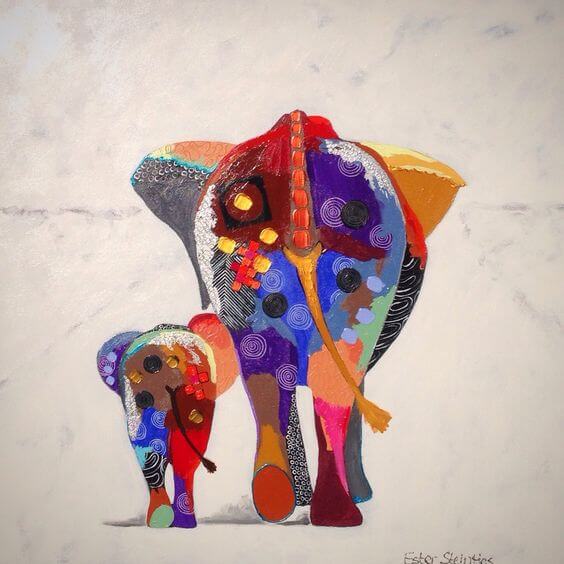I Will Teach You To Value Yourself, My Child


Written and verified by the psychologist Valeria Sabater
I will teach you to value yourself, my child. I will show you that you are worthy of this world. You can dream big because your legs are strong and your mind is free to overcome any hurdle and reach the stars. I will teach you humility, but also the ability to respect yourself.
This message, this idea, is something that all of us, as mothers, fathers, and educators, have in mind. However, as Wayne Dyer explains in his book “Your Erroneous Zones”, when one loves oneself enough, someone else’s disapproval does not bother us. That is something that we, as adults, know. But this is not the case in children.
“Self-love enables growth in a person who is courageous enough to take responsibility for his own existence” – Victor Frankl
An upbringing that includes a lot of disapproval and criticism – that we often believe will teach our children “life lessons” – can actually lead to low self-esteem in both the short and long term. This is because the child will grow up to always be dependent on what others say or do.
Regardless of what we may think, it isn’t easy to promote this strong and healthy self-esteem that every child should start working on at an early age in life. This is due to a very simple reason: if mom and dad do not value themselves, they will pass on their own weaknesses and insecurities to their child.
Today, in “You Are Mom” we will provide you with a few keys to reflect on.
I will teach you to value yourself, I will take care of myself so as to give you my strengths

Something that we have undoubtedly told you many times on our site, is that you should invest in your own wellbeing, your mental health, and your personal growth. If you are happy, you will give happiness. If you know how to give happiness, you will give the world strong men and women.
The task at hand, the effort, is worth it. Therefore, we propose to take the following ideas into account.
I will teach you to value yourself through play
Symbolic play is a great strategy through which to teach our children values and correct coping mechanisms.
A simple yet effective way to do this is through dolls, be it stuffed animals or classic lego figurines.
- You can recreate stories: “Carlos’ classmates call him ugly and stupid” “What would you say to help him?” “And if you were Carlos… what would you think? How would you react? Do you really think he is ugly and stupid just because another child says so?”
Use positive reinforcement
Knowing how to discipline our children is an art that not all mothers and fathers possess. We should never fall into the typical situation of “you have broken something yet again, you are the worst child in the world,” “you have failed this exam because you are no good at mathematics, your brother is more dedicated than you.”
- Positive reinforcement means showing the child what it was he did wrong and how he can improve in the future
- During positive reinforcements, we should never make comparisons
- At the same time, we should try to help the child feel more confident: “I know you’ve made a mistake but mom believes in you and knows you will do better next time.”
Avoid unbelievable or over-the-top compliments

Something we should have in mind is that certain words, phrases, and adjectives that are usually positive, may in many occasions not be useful when trying to improve self-esteem.
Phrases such as “you are the most handsome child” or “you are the smartest kid in the world” or that way of praising when we just see a child’s drawing and say “it’s beautiful” may actually not be useful to them.
Positive reinforcement, the one that actually favors a child’s self-esteem, needs to be honest, logical, measured, and, above all, real.
- For this reason, it is important that you personalize the compliment: “you are a responsible child and I love you for who you are; I know you will achieve whatever you put your mind to because you know how to work hard and, even though you sometimes make mistakes, I will always be there for you.”
- Be objective in your judgment and make them be useful to our child: “I like this drawing, but I think this color would have been better, don’t you think?”
“Those that believe they can’t do something, will never do it, even if they have the skills” –Indira Ghandi
I will teach you to value yourself through autonomy and responsibility
To promote good self-esteem, it is essential that the child has responsibilities and that he learns how to be autonomous. This way, he will feel proud of his achievements and skills.
Nevertheless, his autonomy will always depend on his abilities and how he shows us that he is able to successfully take on certain responsibilities.
The child will show us when the time is right; that is why we as parents need to be agile facilitators, wise guardians that know when and how to offer our child wings while also strengthening his roots.
I will teach you to value yourself, my child. I will show you that you are worthy of this world. You can dream big because your legs are strong and your mind is free to overcome any hurdle and reach the stars. I will teach you humility, but also the ability to respect yourself.
This message, this idea, is something that all of us, as mothers, fathers, and educators, have in mind. However, as Wayne Dyer explains in his book “Your Erroneous Zones”, when one loves oneself enough, someone else’s disapproval does not bother us. That is something that we, as adults, know. But this is not the case in children.
“Self-love enables growth in a person who is courageous enough to take responsibility for his own existence” – Victor Frankl
An upbringing that includes a lot of disapproval and criticism – that we often believe will teach our children “life lessons” – can actually lead to low self-esteem in both the short and long term. This is because the child will grow up to always be dependent on what others say or do.
Regardless of what we may think, it isn’t easy to promote this strong and healthy self-esteem that every child should start working on at an early age in life. This is due to a very simple reason: if mom and dad do not value themselves, they will pass on their own weaknesses and insecurities to their child.
Today, in “You Are Mom” we will provide you with a few keys to reflect on.
I will teach you to value yourself, I will take care of myself so as to give you my strengths

Something that we have undoubtedly told you many times on our site, is that you should invest in your own wellbeing, your mental health, and your personal growth. If you are happy, you will give happiness. If you know how to give happiness, you will give the world strong men and women.
The task at hand, the effort, is worth it. Therefore, we propose to take the following ideas into account.
I will teach you to value yourself through play
Symbolic play is a great strategy through which to teach our children values and correct coping mechanisms.
A simple yet effective way to do this is through dolls, be it stuffed animals or classic lego figurines.
- You can recreate stories: “Carlos’ classmates call him ugly and stupid” “What would you say to help him?” “And if you were Carlos… what would you think? How would you react? Do you really think he is ugly and stupid just because another child says so?”
Use positive reinforcement
Knowing how to discipline our children is an art that not all mothers and fathers possess. We should never fall into the typical situation of “you have broken something yet again, you are the worst child in the world,” “you have failed this exam because you are no good at mathematics, your brother is more dedicated than you.”
- Positive reinforcement means showing the child what it was he did wrong and how he can improve in the future
- During positive reinforcements, we should never make comparisons
- At the same time, we should try to help the child feel more confident: “I know you’ve made a mistake but mom believes in you and knows you will do better next time.”
Avoid unbelievable or over-the-top compliments

Something we should have in mind is that certain words, phrases, and adjectives that are usually positive, may in many occasions not be useful when trying to improve self-esteem.
Phrases such as “you are the most handsome child” or “you are the smartest kid in the world” or that way of praising when we just see a child’s drawing and say “it’s beautiful” may actually not be useful to them.
Positive reinforcement, the one that actually favors a child’s self-esteem, needs to be honest, logical, measured, and, above all, real.
- For this reason, it is important that you personalize the compliment: “you are a responsible child and I love you for who you are; I know you will achieve whatever you put your mind to because you know how to work hard and, even though you sometimes make mistakes, I will always be there for you.”
- Be objective in your judgment and make them be useful to our child: “I like this drawing, but I think this color would have been better, don’t you think?”
“Those that believe they can’t do something, will never do it, even if they have the skills” –Indira Ghandi
I will teach you to value yourself through autonomy and responsibility
To promote good self-esteem, it is essential that the child has responsibilities and that he learns how to be autonomous. This way, he will feel proud of his achievements and skills.
Nevertheless, his autonomy will always depend on his abilities and how he shows us that he is able to successfully take on certain responsibilities.
The child will show us when the time is right; that is why we as parents need to be agile facilitators, wise guardians that know when and how to offer our child wings while also strengthening his roots.
All cited sources were thoroughly reviewed by our team to ensure their quality, reliability, currency, and validity. The bibliography of this article was considered reliable and of academic or scientific accuracy.
- Bowlby, J. (1986). Vínculos afectivos: formación, desarrollo y pérdida. Madrid: Morata.
- Bowlby, J. (1995). Teoría del apego. Lebovici, Weil-HalpernF.
- Garrido-Rojas, L. (2006). Apego, emoción y regulación emocional. Implicaciones para la salud. Revista latinoamericana de psicología, 38(3), 493-507. https://www.redalyc.org/pdf/805/80538304.pdf
- Marrone, M., Diamond, N., Juri, L., & Bleichmar, H. (2001). La teoría del apego: un enfoque actual. Madrid: Psimática.
- Moneta, M. (2003). El Apego. Aspectos clínicos y psicobiológicos de la díada madre-hijo. Santiago: Cuatro Vientos.
This text is provided for informational purposes only and does not replace consultation with a professional. If in doubt, consult your specialist.








